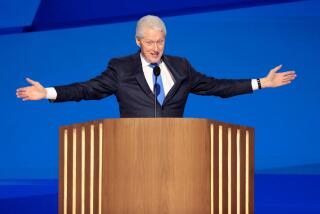Gore Keeps His Pre-Race Footing at Party Gathering With Gephardt
- Share via
WASHINGTON — The two principal prospective rivals for the Democratic presidential nomination in 2000, Vice President Al Gore and House Minority Leader Richard A. Gephardt, displayed their wares Saturday before influential party leaders. While both were warmly received, it was Gore--despite his fund-raising-related woes--who seemed to come out ahead, if only because that’s where he started.
In speeches before the fall meeting of the Democratic National Committee, the two men differed mostly in tone and emphasis, with Gephardt being more impassioned and evoking a more enthusiastic response. On the single substantive difference between the two--President Clinton’s request for a free hand in negotiating trade pacts--Gephardt made his opposition clear without directly confronting the White House.
The absence of a dramatic and compelling contrast worked to the advantage of Gore, far and away the early front-runner in the race, party leaders agreed. Most of them would like to avoid a divisive Democratic contest that could weaken the party’s chances in 2000.
“I think both men are on the same track,” said Emilie Holroyd, a committee member from West Virginia and a Gore backer. As for Gephardt, she said: “I think he’d make a wonderful speaker of the House.”
Explaining Gephardt’s reluctance to take the offensive against the White House, Steven Elmendorf, the Missouri lawmaker’s chief of staff, said, “We have to get along with these guys on the Hill.” But, he added, “if there is a campaign it would be different.”
Presumably as a declared candidate, Gephardt would offer himself as a populist alternative to the centrist “new Democrat” course Clinton and Gore have charted for their party.
But for the time being, Gephardt seems restrained in his rhetoric, though on Saturday he dramatized his objections to the president’s request for “fast-track” trade authority, which would require lawmakers tp take a straight up-or-down vote on agreements negotiated by Clinton.
Gephardt showed color slides from a recent visit to Juarez, Mexico, intended to demonstrate that the Clinton-backed North American Free Trade Agreement worsened living conditions for Mexican workers.
Instead of attacking Clinton, Gephardt resorted to exhortation. “Trade is good,” he said. “But it cannot be trade without values and worker rights and environmental worker protection. I want it to be capitalism with a moral face.”
In Gore’s only reference to the trade issue, he strove to reassure party leaders. “This president, unlike his Republican predecessors, knows how to protect labor rights and the environment,” he said.
Even Gore’s involvement in the Democrats’ fund-raising controversy, which most independent analysts view as his greatest political vulnerability, seemed transformed into something of an asset before this audience of party faithful. They see Gore’s legal difficulties as the consequence not of wrongdoing but of GOP efforts to make him a scapegoat in their vendetta against the Clinton administration.
In this setting, Gore joked about the controversy--despite the fact that a current Justice Department review could lead to the appointment of an independent counsel to investigate fund-raising phone calls he made from the White House.
“Before I begin my speech, I want to check with you one more time,” he said. “This is not a fund-raiser, is it?”
Gore’s comment was a reference to his appearance at a luncheon event--which he has said he did not know was a fund-raiser--at the Hsi Lai Buddhist Temple in Hacienda Heights.
Saying the Clinton administration has “restored America’s faith in Democratic values” and won back “the trust of America’s middle class,” Gore ticked off a series of past accomplishments and future goals that ranged from balancing the federal budget and streamlining government to protections for the rights of organized labor and environmental safeguards.
Though neither Gore nor Gephardt made reference to the upcoming competition for the presidential nomination, both made efforts to gain the good graces of the more than 400 committee members, all of whom will be automatic delegates to the party’s national convention. Gore hosted two receptions at his official residence for committee members, and addressed a meeting of state party chairmen--as did Gephardt and another possible contender in 2000, Nebraska Sen. Bob Kerrey.
And the Rev. Jesse Jackson, who addressed DNC members Friday, also dropped a hint that he might run. Referring at one point to “President Jackson,” meaning Andrew, he added archly: “No pun intended.” His aide, Steve Cobble, said, “You can call that a warning shot.”
More to Read
Get the L.A. Times Politics newsletter
Deeply reported insights into legislation, politics and policy from Sacramento, Washington and beyond. In your inbox three times per week.
You may occasionally receive promotional content from the Los Angeles Times.










